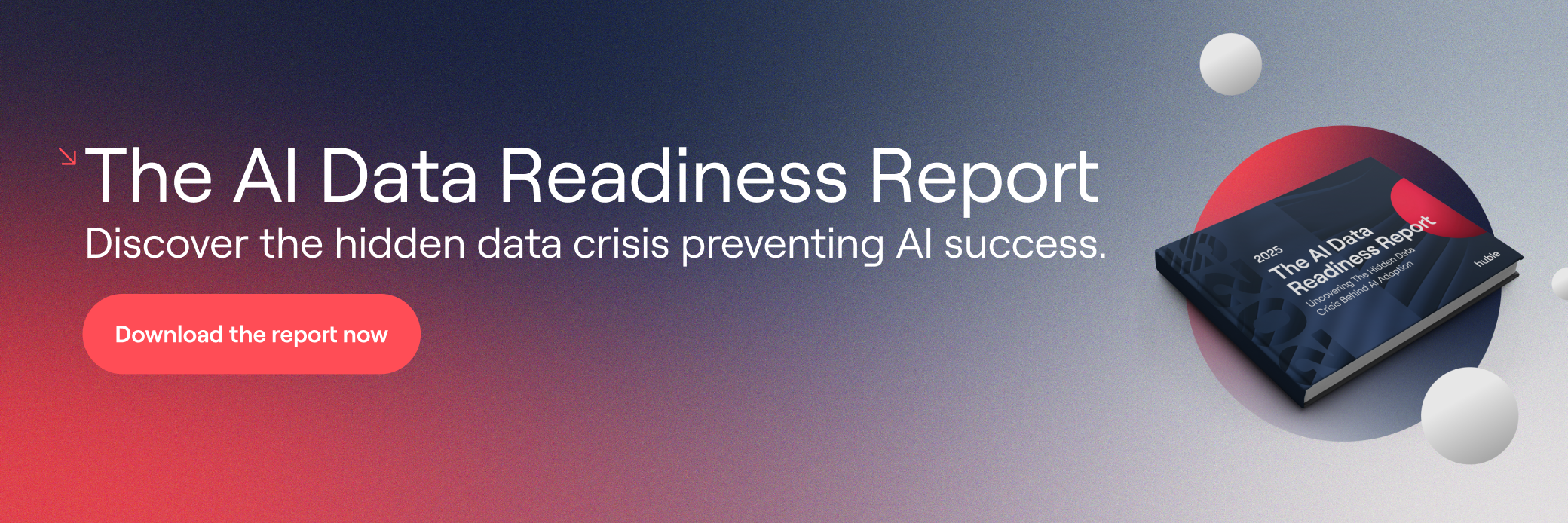AI is becoming central to how CRM systems operate - but plugging powerful language models like ChatGPT or Claude into real business workflows isn’t always simple. These models need context to work effectively: customer histories, sales pipelines, compliance rules, and more.
That’s where MCP comes in. Short for Model Context Protocol, MCP is an emerging open standard that allows AI models to securely connect with systems like HubSpot, enabling them to take meaningful actions, personalize interactions, and understand your data without needing complex engineering or custom APIs.
In this article, we’ll break down what MCP actually is, why it’s a breakthrough for AI integration, and how organizations can use it to power more intelligent, connected CRM experiences.
What is MCP?
MCP refers to Model Context Protocol, an open standard developed to help large language models (LLMs) like ChatGPT, Claude, or Perplexity interact with external systems in a secure, structured way.
Think of it like a digital connector, just as USB lets you plug physical devices into your computer, MCP allows AI models to “plug into” platforms like HubSpot, so they can read and write data, take action, and provide responses grounded in your CRM.
With MCP, organizations can integrate AI into their existing workflows without building custom code or APIs. The protocol lets your LLMs understand context from customer records, deals, service tickets, and more, turning generic chatbots into highly capable agents that work across your tools and processes.
How HubSpot’s MCP server works
At its core, HubSpot’s MCP server enables AI models to interact with HubSpot through a standardized interface. Instead of building complex integrations or manually feeding models your CRM data, MCP lets you expose relevant parts of HubSpot, like contacts, deals, tickets, or custom objects, in a structured, secure way the model can understand.
Here’s how it typically works:
- You define what the AI model can access: Specific fields, records, or workflows within your HubSpot instance.
- The model uses MCP to “ask” HubSpot for context: For example, “What’s the latest interaction with this lead?” or “What open tickets does this customer have?”
- It generates a response or takes action based on your instructions and the data it sees, such as updating a record, triggering a workflow, or summarizing account activity.
This unlocks a wide range of possibilities: from customer service agents that know your entire CRM history, to sales assistants that help reps craft personalized follow-ups, to marketing bots that can launch campaigns directly from a conversation.
HubSpot’s MCP support in action: 10 possible scenarios
HubSpot’s MCP server unlocks powerful new ways to connect AI assistants, like ChatGPT, Claude, or custom-built agents, with your CRM data in real-time.
Instead of siloed AI models or manual data wrangling, MCP acts as a seamless bridge, enabling AI tools to query and interact directly with HubSpot’s rich customer, sales, and service records. This connectivity drives smarter automation, personalized insights, and contextual decision-making that keep pace with your complex, evolving business needs.
Below are ten practical scenarios showcasing how MCP empowers your teams to deliver more efficient sales, service, and marketing experiences by harnessing AI agents connected directly to your CRM data.
1. Intelligent lead routing with real-time CRM context
Leads come in from diverse regions and segments, but not all are sales-ready or compliant for immediate action. By connecting AI agents via MCP, your AI assistant can dynamically access lead data, regional compliance info, and prioritize or route leads accordingly.
For example, a medtech firm marketing a diagnostic device across multiple countries can let the AI agent check real-time product approval status in HubSpot before recommending which leads to push to sales and which to nurture. This minimizes wasted outreach and ensures communications are compliant and timely.
2. Enhanced lead qualification combining CRM data and risk signals
Traditional lead scoring often misses key compliance or risk factors hidden in internal records. By empowering AI assistants to query HubSpot data via MCP, they can cross-reference CRM lead info with regulatory flags, KYC results, and client type indicators to deliver richer qualification insights.
A global investment firm, for instance, can rely on AI-powered lead scoring that factors jurisdictional risk and past compliance screenings alongside engagement metrics, delivering sales teams prioritized lists of leads that are both interested and viable.
3. Proactive service alerts powered by IoT and CRM integration
Companies selling complex equipment can use MCP to connect AI agents to both CRM records and IoT sensor data. The AI can detect early warning signs of machine issues by analyzing sensor streams alongside service history stored in HubSpot.
When a vibration threshold is crossed or temperature spikes, the AI creates service tickets or alerts the right customer success manager, enabling preventive maintenance. This proactive approach reduces downtime and emergency costs while boosting customer satisfaction.
4. Detecting account expansion opportunities through usage and CRM signals
Growth often depends on spotting when current customers are ready to buy more. AI agents connected via MCP can analyze CRM data and user activity patterns to score accounts for expansion potential.
For example, a SaaS provider can have the AI detect spikes in feature usage, new user invites, or support interactions, then recommend outreach to accounts exhibiting expansion readiness. This replaces guesswork with data-driven, timely upsell campaigns.
5. Mapping buyer journeys with real-world CRM and conversation data
Sales pipelines rarely follow linear paths, especially in regulated industries. AI agents can access deal histories, call transcripts, and timelines in HubSpot via MCP to build nuanced buyer journey maps.
A healthcare software vendor might use this to predict where deals are stalled or drifting off course, then recommend targeted next steps, like engaging clinical champions or escalating to executives, leading to more accurate forecasting and deal management.
6. Tailoring sales guidance to local regulations and workflows
Global organizations face diverse regulatory landscapes. With MCP, AI assistants can pull regional compliance requirements and approval workflows from HubSpot records and provide sales reps with market-specific next steps.
A multinational bank operating in 20+ countries, for instance, can equip reps with AI-driven prompts highlighting missing documents or steps needed for their specific jurisdiction, speeding deal progress while ensuring compliance without losing global alignment.
7. Prioritizing deals by supply chain status and profit margins
Physical goods businesses must weigh deal feasibility alongside sales potential. Through MCP, AI can fetch real-time inventory levels, shipping constraints, and product margins from HubSpot to rank deals dynamically.
An industrial equipment manufacturer can deprioritize low-margin deals with long lead times, focusing sales effort on profitable, ship-ready opportunities. This reduces friction between sales and operations while maximizing profitability.
8. Delivering personalized content to diverse buying committees
Complex enterprise deals involve multiple stakeholders with varied interests. AI agents connected to HubSpot via MCP can track CRM engagement and role data to recommend content tailored to each stakeholder.
A SaaS vendor selling to Fortune 500 companies might have AI send technical docs to IT leads, pricing transparency to procurement, and ROI decks to executives, all timed to buyer behavior and deal stages, streamlining communication and accelerating consensus.
9. Early detection of churn risk using CRM activity patterns
Customer churn often begins with subtle disengagement signals that standard reports miss. AI assistants using MCP can monitor HubSpot activity logs, support interactions, and communication history to flag accounts at risk.
For a financial software provider, this means catching warning signs like reduced logins or canceled meetings early, alerting account managers to intervene with tailored retention strategies before renewal problems arise.
10. Accurate multi-touch campaign attribution across regions and roles
Enterprise buyers interact with campaigns across geographies, channels, and long timelines. AI agents connected via MCP can analyze complex HubSpot campaign data to assign credit precisely, beyond simplistic last-touch models.
For instance, a global healthcare tech firm can better understand which mix of webinars, downloads, and trade shows influenced deals, with role-based weighting and regional adjustments, allowing marketing to optimize investments and sales to gain clearer insight into buyer journeys.
By leveraging MCP to integrate AI assistants with your CRM, organizations can dramatically enhance the relevance, agility, and precision of their customer-facing operations. Whether it’s prioritizing leads with real-time compliance checks, predicting service needs before failures occur, or personalizing content for diverse buyer committees, MCP provides the connective tissue that unlocks AI’s full potential on top of your HubSpot data.
This evolving capability ensures your business stays competitive in rapidly shifting markets, delivering better outcomes through AI-powered intelligence—right where your data lives.
Unlock the full potential of MCP
HubSpot’s MCP server represents a transformative step in how businesses leverage AI alongside their CRM data. By enabling custom AI models to directly access and learn from your HubSpot records, MCP unlocks tailored, actionable insights that drive smarter lead qualification, proactive service, personalized outreach, and much more.
The ten scenarios outlined above demonstrate just a fraction of MCP’s potential to streamline complex workflows, improve compliance, and accelerate growth across industries.
As AI continues to evolve, MCP will be the foundation for increasingly sophisticated automation and decision-making, helping your teams work faster, smarter, and more confidently.
Want to unlock the power of custom AI for your business? Reach out to Hubble today and see how we can help.













-3.png?width=500&height=320&name=Matt%20-%20imagery%20bank%20(8)-3.png)
